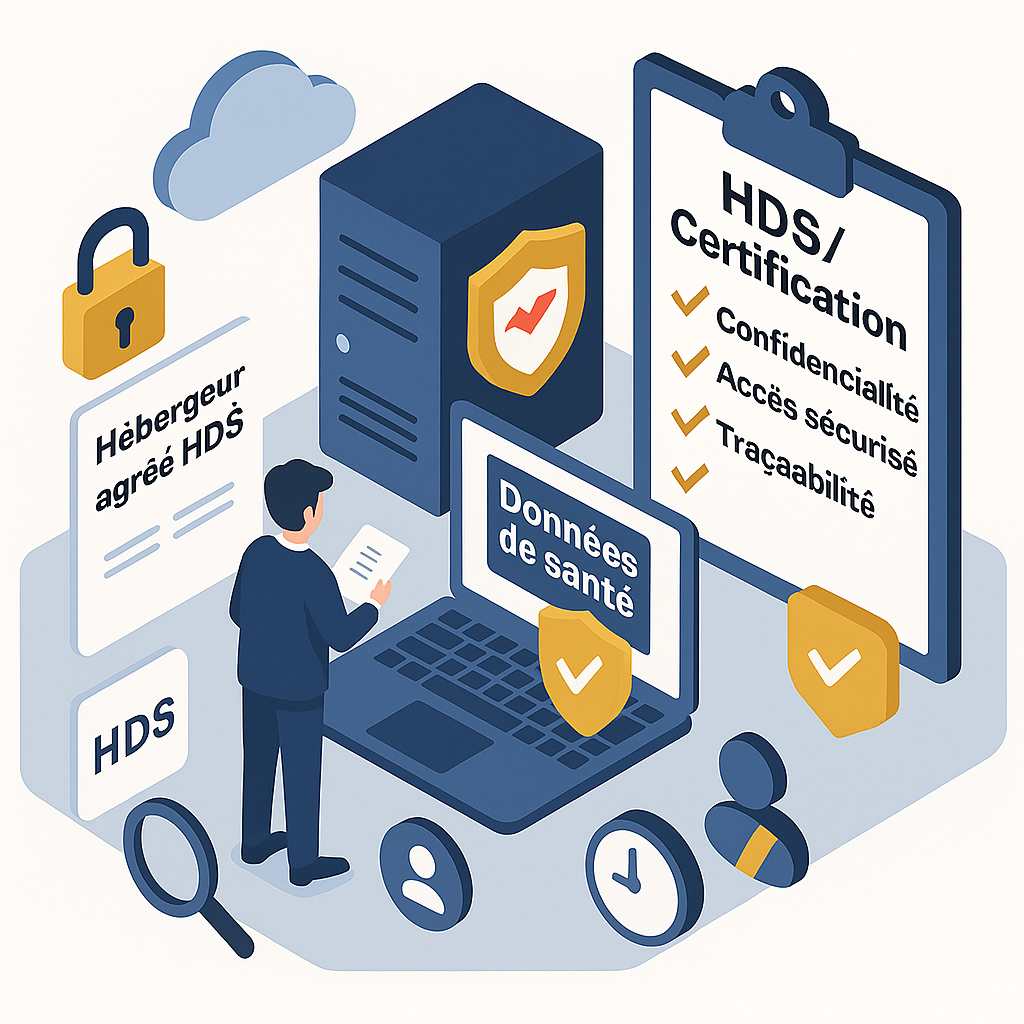At a time when the digitization of the healthcare sector is accelerating, the issue ofhealthcare data hosting is of crucial importance. This highly sensitive information benefits from enhanced legal protection, which imposes specific constraints on organizations.
Between strict regulations and security issues, how do you navigate this complex framework to ensure the compliance of your healthcare information systems? We take a look at the obligations and best practices to adopt.
If you would like to retain the services of an accommodation contract lawyer, please contact me!
The specific regulatory framework: enhanced protection
The hosting of healthcare data is subject to a particularly strict regulatory framework, which has undergone significant changes in recent years. At the confluence of the RGPD and specific national regulations, this framework aims to guarantee a level of protection tailored to the particular sensitivity of this information.
In France, the HDS (Hébergeur de Données de Santé) certification system is the cornerstone of this scheme. This certification, which replaced the former accreditation scheme in 2018, applies to any player hosting personal health data, whether medical records, prescription information, medical imaging or any other data relating to the health status of an identified or identifiable person.
The scope of this certification is broad, as it concerns healthcare establishments, self-employed professionals, medical software publishers, telemedicine platforms, as well as insurance companies and mutual insurers who process medical data. This certification applies not only to direct hosting providers, but also to service providers offering SaaS or PaaS solutions involving the storage of healthcare data.
HDS certification comprises six fundamental requirements: security policy, risk analysis, human resources management, asset management, access control and incident management. It is issued by accredited certification bodies and must be renewed regularly, generally every three years.
At European level, the draft European Health Data Space regulation will further strengthen this framework by harmonizing practices across the continent and facilitating the secure sharing of health data between member states.
Legal and financial risks: dissuasive penalties
Failure to comply with legal obligations concerning the hosting of healthcare data exposes organizations to considerable legal, financial and reputational risks.
In legal terms, failure to obtain HDS certification for health data hosting constitutes an infringement that can be punished by administrative fines imposed by the CNIL of up to 20 million euros, or 4% of worldwide sales in the most serious cases. In addition to these administrative penalties, criminal proceedings may be instituted in the event of negligence leading to a data breach, with penalties of up to five years' imprisonment and a fine of 300,000 euros for those responsible.
In addition to administrative and criminal sanctions, health data breaches also expose organizations to civil liability claims from the individuals concerned. These actions can give rise to potentially large claims for compensation, especially if the number of victims is high.
The reputational dimension should not be overlooked either. In the healthcare sector, trust is a particularly valuable asset, and a data breach can lead to a lasting loss of confidence among patients, healthcare professionals and partners. Several high-profile cases of medical data leaks have had disastrous consequences for the establishments concerned, with lasting impacts on their business and image.
Finally, security incidents in this area can also lead to significant operational disruption, as demonstrated by recent cyber attacks on hospitals, with potentially dramatic consequences for continuity of care and patient safety.
Specific obligations of health data hosts
HDS-certified service providers are subject to particularly strict obligations that go far beyond standard security requirements. These obligations are based on several fundamental principles to guarantee the protection of sensitive data.
Security governance is the first pillar of these obligations. Hosting providers must implement a formal security policy, appoint a dedicated Information Systems Security Manager (ISSM), and carry out regular, documented risk analyses. This governance must also include a robust business continuity plan to guarantee data availability, even in the event of a major incident.
Physical security requirements are particularly stringent. Data centers hosting healthcare data must meet strict standards for protection against intrusion, fire, flooding and other environmental hazards. Physical access to servers must be strictly controlled, with badge, biometric and video surveillance systems.
Logical security requires data encryption, both at rest and in transit, with particularly robust key management mechanisms. Segregation of environments, fine-tuned management of access rights according to the principle of least privilege, and implementation of advanced intrusion detection solutions are also required.
Traceability is a fundamental requirement, and access and activity logs must be kept so that it is possible to reconstruct precisely who accessed what data, when and for what reason. These logs must be kept for a period defined by regulations, and protected against any alteration.
Particular attention is also paid to human resources management, with compulsory background checks for staff with access to sensitive data, reinforced confidentiality commitments, and regular health data security awareness programs.
Unlike a standard hosting contract, the hosting of healthcare data requires additional guarantees and the use of an HDS-certified service provider. This certification guarantees that the hosting provider has the appropriate technical and organizational measures in place to protect sensitive data.
Checklist for choosing a compliant hosting provider
Faced with these complex requirements, choosing a healthcare data hosting provider is a strategic decision that must be based on a methodical evaluation. Here are the main criteria to consider when selecting a compliant and reliable provider.
The validity and scope of HDS certification is naturally the first essential point of verification. It's important to check that the certification covers all the activities required for your project, and to ask for valid certificates. Don't hesitate to consult the official list of certified hosting providers maintained by the certification body.
The contractual guarantees offered by the hosting provider must be carefully examined. The contract must explicitly mention commitments in terms of health data protection, guaranteed service levels (particularly in terms of availability and recovery time), and redress mechanisms in the event of breach. The division of responsibilities between the customer and the hosting provider must be clearly established, particularly concerning obligations relating to the RGPD.
Thetechnical infrastructure must be assessed according to criteria such as datacenter location (ideally in France or the European Union to simplify international transfer issues), redundancy of critical systems, backup and disaster recovery mechanisms, and the encryption technologies used.
Operational security procedures deserve particular attention. In particular, examine incident management processes, maintenance and patching procedures, the frequency of penetration tests and security audits, and vulnerability monitoring mechanisms.
Transparency and communication are essential indicators of a hosting provider's maturity. A quality provider must be able to provide regular reports on service levels achieved, security incidents (even minor ones), and continuous improvement measures implemented. Some hosting providers offer customer portals for real-time monitoring of these indicators.
The service provider's references in the healthcare sector are also an important factor. A hosting provider with experience in this specific sector will have a better understanding of the business challenges and regulatory constraints specific to the medical field.
How to structure a healthcare data hosting project
Setting up a healthcare data hosting project requires a structured, methodical approach to ensure compliance and security right from the design stage. Several key stages must be respected to ensure the success of this type of project.
Thepreliminary analysis phase is decisive in precisely identifying the types of data concerned, their level of sensitivity, and the processing envisaged. This mapping enables us to clearly determine the scope of HDS certification required, and to identify any data that could be processed in a standard environment, thus reducing costs. This phase must also include a Data Protection Impact Assessment (DPIA), mandatory for health data processing under the RGPD.
The definition of technical and functional requirements must be particularly rigorous. Over and above purely technical aspects such as storage capacity or bandwidth, security and compliance requirements must be precisely formalized. This stage generally leads to the drafting of detailed specifications, which serve as a basis for consultation with potential service providers.
The service provider selection process should include an in-depth audit of candidates, going beyond simple verification of certifications. Datacenter visits can be organized, customer references contacted, and technical tests carried out to validate service providers' claims. The selection process should involve various stakeholders in the organization: CIO, DPO, CISO, medical and legal departments, to ensure a comprehensive assessment.
Contractualization is a critical stage that should not be underestimated. The health data hosting contract must cover all regulatory, technical and operational aspects of the service. Particular attention must be paid to the technical annexes, which detail service levels, operating procedures and security features. Particular care must also be taken when drafting the subcontracting agreement within the meaning of the RGPD.
The transition and go-live phase must be carefully planned to ensure data integrity and confidentiality during migration to the new platform. Thorough security, performance and disaster recovery tests must be carried out before going live. This phase must also include training internal teams in the new operating and security procedures.
Last, but by no means least, is operational monitoring. A regular steering committee must be set up with the service provider to monitor performance and security indicators, manage changes, and ensure the ongoing compliance of the system with regulatory and technical developments.
Best practices for optimum safety
In addition to strict compliance with regulatory requirements, a number of best practices can significantly enhance the security of hosted healthcare data and reduce the risk of incidents.
The data minimization principle is a fundamental approach that involves collecting and processing only the data that is strictly necessary for the intended purpose. This approach, enshrined in the RGPD, takes on particular importance for health data. It can result in the anonymization or pseudonymization of data when precise identification is not necessary, thus considerably reducing the risks in the event of a breach.
A defense-in-depth approach is particularly recommended to protect healthcare data. This strategy consists of deploying several complementary layers of security (firewalls, intrusion detection systems, encryption, access controls, etc.) so that a failure at one level is compensated for by protection at other levels. This redundancy of security mechanisms is essential in the face of increasingly sophisticated threats.
Regular security testing is a cornerstone of any protection strategy. Over and above regulatory requirements, it is recommended to carry out in-depth penetration tests at least once a year, supplemented by more frequent vulnerability scans. These tests should be carried out by independent teams, ideally certified, and give rise to documented corrective action plans.
Ongoing training of technical teams and users represents a crucial but often neglected investment. Employees must be regularly made aware of the specific risks associated with health data, good security practices, and the procedures to follow in the event of an incident. This awareness must be adapted to the different profiles and responsibilities within the organization.
Keeping an active watch on regulatory and technological developments is essential in such a dynamic field. This watch must enable us to anticipate changes in standards, identify new threats, and rapidly adapt our protection systems. Joining communities specialized in health data security can facilitate this monitoring work.
Finally, it is essential to draw up and regularly test an incident response plan specific to health data. This plan must precisely define procedures for containment, analysis, remediation and communication in the event of a breach, taking into account specific obligations to notify the CNIL and, where applicable, the individuals concerned.
Legal expertise, an asset for compliance
Hosting healthcare data represents a challenge at the crossroads of technical, regulatory and organizational requirements. In this complex and evolving context, legal expertise is a strategic asset in navigating the various obligations and implementing effective governance.
HDS certification should not be seen solely as a regulatory constraint, but as an opportunity to strengthen the confidence of patients and healthcare professionals in the digital services on offer. This trust is a precious asset in a sector undergoing rapid digital transformation.
Organizations that approach this issue with rigor and method, surrounding themselves with the appropriate expertise, are not only in compliance with regulations but also benefit from a significant competitive advantage in a rapidly expanding e-health market.
In this process of compliance and security, legal counsel plays a decisive role in correctly interpreting regulatory requirements, negotiating balanced contracts with service providers, and implementing appropriate healthcare data governance.



